|
Ralph Heiden - Do you recall any stories about your grandfather,
August Heiden ?
William Frank Heiden - About all I remember of him is going over to their place
on South Custer and he would be sitting in that old high back chair.
Marie (Heiden) Tommelein - And he had that earphone in his ear so he could hear.
William Frank Heiden - Other than that, I really donít remember anything else
about him.
Ralph Heiden - We always heard a story about when they came over that a
little daughter died on the ship. Well,
Myrna (Drake) Bishop who is
Bertha (Heiden) Drakeís daughter and granddaughter of
Herman Heiden, was told that
the little girl lived through the voyage but died here and is buried
in Monroe. Mary Lou did some detective work and found that she was
buried in Zion Lutheran Cemetery in Monroe on June 16, 1873 only 12
days after they landed in New York.
Marie (Heiden) Tommelein - And there was a gravestone for her?
Ralph Heiden - Yes.
Mildred (Roggerman) Heiden - There was a
Laas baby buried next to her too.
Ralph Heiden - Thatís another question. I keep hearing about the
Laasí but
nobody really knows what relation they were to the Heidens.
Marie (Heiden) Tommelein - They were always there at the reunions.
William Frank Heiden - I think it was Bill
Laas from Texas. They came every year.
Marie (Heiden) Tommelein -
There was Miss Libbie Laas. I donít think she ever got
married but I can remember her being there.
William Frank Heiden - Maybe they came over from Germany together or something.
There had to be some connection. They were always big at the
reunions along with the
Burmeisters.
Mary Lou (Heiden) Opfermann - Since
Meta was buried next to a Laas, it makes you wonder
if they had some early connection.
Marie (Heiden) Tommelein - Did the Laasí come over on the boat with August?
Ralph Heiden - No. The one (Laas child) that is buried at Zion Cemetery was buried in
1869, four years earlier. So, they were already here.
Hereís an idea that Iím starting to wonder about. August, my great
grandfather, had a half sister. In the 1920's, her granddaughter
sent a series of letters to Augustís wife, Rika.
I finally found an elderly German lady who could read the old script
writing and is translating those letters word for word. I have about
5 or 6 of them done now.
In one of the letters, they say that they were corresponding with
Elizabeth Laas. So, perhaps, the Laasí are descendants of
August Heiden's half-sister. They would be a distant relative but still
related. I donít have any evidence to draw that conclusion but it
might be that way.
Mary Lou (Heiden) Opfermann - That could be the connection.
Ralph Heiden - The letters are rather sad overall. They were having some
very tough times in Germany then and they were always asking their
Aunt Rika, my great grandmother, for money.
Mildred (Roggerman) Heiden - In one of them, they ask for some money for a house and
some land. Then, later they say they bought the house but needed
more money for the land.
Marie (Heiden) Tommelein - Did they ever help them?
Ralph Heiden - Yes, they sent money when they could and they were always
very appreciative of it and told what the money would buy.
Brick Tommelein - My dad said that at that time, everyone over in Europe
called America ďthe land of opportunity.Ē
Ralph Heiden - A lot of people here were helping their relatives then too.
In one of the letters, they ask Rika to send her letters registered
because people were stealing things from mail from America because
those envelopes were likely to have money in them.
Helen (Henning) Heiden - Now are these letters all from Mecklenburg?
Ralph Heiden - Yes. They are from the area called Mecklenburg and the port
city of Rostock. The little villages where our ancestors came from
are the size of
Grape and Maybee and they are about 50 miles from
Rostock.
Helen (Henning) Heiden - From the Hennings, I heard them say that the people were
like slaves back then in Germany. They worked for all these big rich
people. They provided pay for them and took care of them but they
couldnít get ahead. They didnít want them to get married because
there were already too many of them to take care of. That is where
the Hennings came from too.
Mildred (Roggerman) Heiden - Didnít you say that our name should be something other
than Heiden?
Ralph Heiden - Yes, my great grandmother,
Maria Heiden, did not marry the
father of August. So, he took her name rather than his fatherís
which was Kannsehr
or Canseyer.
Helen (Henning) Heiden - Thatís the same way with my grandpa Henning. Grandma wasnít
married when she had those two kids.
Ralph Heiden - That was a real common occurrence back then.
Mildred (Roggerman) Heiden - They wouldnít let you get married unless you could support
yourself.
Ralph Heiden - They technically werenít slaves but there was nowhere else
for them to go except to another big estate to work and they were
full too. Also, the landowner had the responsibility to take care of
the people on his land so he was stuck too.
That is why they pushed a lot of them to leave and go to America.
Also, the illegitimacy rate went way up because even though they
werenít legally allowed to marry, people continued to form couples
and do what they needed to do.
Helen (Henning) Heiden - You wonder why the Heidens would come here but they said on
the Henning side that they would send money back to Germany to help
others come here.
Ralph Heiden - But with the Heidens, we donít know who was here to pave the
way for them. Maybe with this Laas connection, there might be
something to go on.
The
Rambows came a year later. They came here in 1874 and I donít
know if they came from the same part of Germany as the Heidens. I
havenít looked into that yet.
I think about the only way we are going to learn why the Heidens
came here is if we stumble onto somebody in one of the other
branches that has an old box of papers up in the attic that someone
gave them long ago. Otherwise, the reason may be lost to history.
[Note: According to
Karen (Berns) Wheaton, the Rambows did come from the
same area in Germany.]
Mary Lou (Heiden) Opfermann - You might get something from
Caroline Brown too. Helma was
going to check with her. She and her husband, Bill, used to attend
all the old reunions. He used to take movies of the reunions. She is
somehow related to the Laas side.
William Frank Heiden - She was Uncle John Laasí daughter.
Marie (Heiden) Tommelein - She came to our place in Florida one time looking for
Helmaís address.
Ralph Heiden - Perhaps she would have the old films laying around
someplace. We could put them on videotape.
Marie (Heiden) Tommelein - I donít remember him taking movies.
Mary Lou (Heiden) Opfermann - Oh, yes. Donít you remember everybody trying to duck out
of the way all the time?
Helen (Henning) Heiden - You know, Aunt
Agnes probably had some old papers.
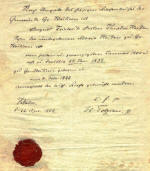 Ralph Heiden - Yes, that is where I got a lot of these old documents. They
had the names of the old villages in Germany where August and his
wife and three of their children were born. There was also a
document that I think is Augustís discharge paper from the army. He
served from 1859 to 1861. Ralph Heiden - Yes, that is where I got a lot of these old documents. They
had the names of the old villages in Germany where August and his
wife and three of their children were born. There was also a
document that I think is Augustís discharge paper from the army. He
served from 1859 to 1861.
Mildred (Roggerman) Heiden - His naturalization papers were there too.
Ralph Heiden - Yes, the papers where he applied for citizenship and then
was granted U.S. citizenship.

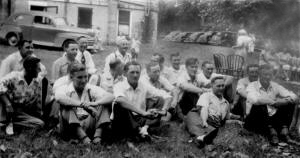 [Looking at some old pictures of the
Heiden Family Reunion and family
gatherings. ] [Looking at some old pictures of the
Heiden Family Reunion and family
gatherings. ]
Mary Lou (Heiden) Opfermann - Is that you in the back row there at the reunion, Brick.
Brick Tommelein - I donít know. I only remember one time going to the reunion.
Ralph Heiden - That picture was taken over at the
Grange Hall sometime in
the late 40's.
Marie (Heiden) Tommelein - Yes, I can see Pa there and I recognize a lot of these other
people but I canít tell if that is you or not.
Helen (Henning) Heiden - I have a couple of albums with some old pictures. Maybe you
already have them all.
Ralph Heiden - You never know. Iíd like to take a look at them.
Marie (Heiden) Tommelein - The caption under this picture says thatís
Libbie and me
sitting on grandma Heidenís lap.
Mary Lou (Heiden) Opfermann - We can spot you in all these pictures because you had
that short, blond hair, Marie.
Dianne (Heiden) Houpt - Did they shut the
Bridge School down at some point?
Ralph Heiden - I think kids went there through the late 1940's before they
were bussed to Dundee.
Dianne (Heiden) Houpt - I went a half a year there before going up to Dundee.
Helen (Henning) Heiden - I remember when you were little, you missed the bus once and
went running behind it, bawling like mad.
 Dianne (Heiden) Houpt - Ralph, do you remember that we started out with the red,
white and blue buses and then the yellow ones came along later. At
school, they never seemed to line them up the same place every
night. They would line up in the order that the drivers happened to
pull up. Some nights, we would get lost. Dianne (Heiden) Houpt - Ralph, do you remember that we started out with the red,
white and blue buses and then the yellow ones came along later. At
school, they never seemed to line them up the same place every
night. They would line up in the order that the drivers happened to
pull up. Some nights, we would get lost.
Ralph Heiden - I remember having Wes Feinauer as a driver. One day, I was
showing off acting like I wanted to thumb a ride as he pulled up.
For some reason he didnít like that and made me sit in the front
seat for a week. I was probably only in the second grade and it
scared me.
Dianne (Heiden) Houpt - He came to the back of the bus and escorted me to the front
seat one time. I saw him years later and he said he wanted to laugh
all the time while he was doing it but didnít dare in front of the
other children.
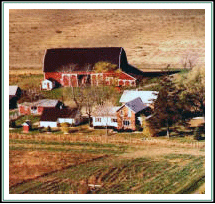 Ralph Heiden - Grandpa
(William C.) Heiden bought this farm in 1909 or there about.
There are stories about great grandpa
(August) Heiden doing the masonry work
on the house. Do you know anything about that? Ralph Heiden - Grandpa
(William C.) Heiden bought this farm in 1909 or there about.
There are stories about great grandpa
(August) Heiden doing the masonry work
on the house. Do you know anything about that?[Note:
Wm Carl Heiden bought the farm on April 1, 1909 which was his 35th
birthday.]
William Frank Heiden - I heard them talking about walking over here from South
Custer when Pa was about 13 or 14 to help his dad do the brick work.
[Note: August Heiden was a
brick mason by trade.]
Ralph Heiden - Then that would have been about 1890. So that was when
someone else owned it?
(Note:
Which would have been while the Meyers
still owned the property.)
William Frank Heiden - Yes, I think it was the Langs or someone else who owned
the farm at that time.
Ralph Heiden - The 1873 county plat book I think lists the owner of this
farm as a man named Meyers.
William Frank Heiden - They called him ďMilky Meyers.Ē I always heard Pa talking
about him.
Ralph Heiden - The plat map also showed a piece of landlocked property
located on the back of this property. There wasnít any access from
Ida-Maybee Road, Dixon, Mulheisen or South Custer.
William Frank Heiden - That would be on the back end of Suhciks farm. It was the
Stokes that had an old house back in there on a hill. Could be some
relation to Bill Stokes, Aunt Emmaísís relations.
Ralph Heiden - There also used to be a house on the north side of the road
just east of here. I know Mary Lou was born there and Carl and Anita
lived there for a while too.
William Frank Heiden - Carl lived next door here where Jessie Barnes lived.
Verdell was born there.
Edna and Henry lived in the other place for a while and
Bill and
Alice (Brossia) Heiden lived there too. Bill worked the farm. That was when
old Jesse Wakefield owned it.

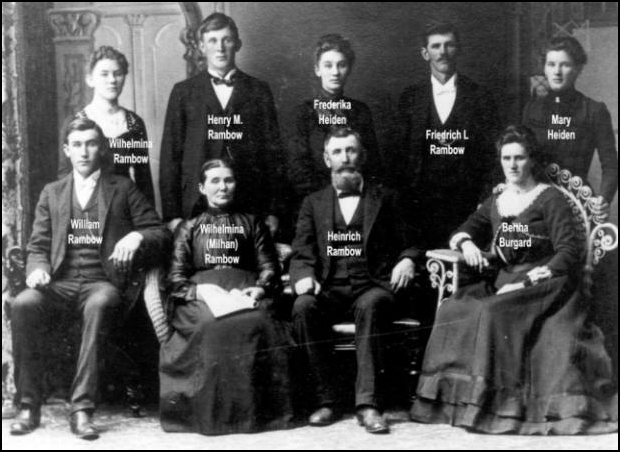
[Looking at family pictures again.]
Helen (Henning) Heiden - Those are the Rambows there.
Uncle Will and Aunt Minnie.
Thatís Aunt Rika.
William Frank Heiden - They more or less looked alike. They were all pretty big
women.
Ralph Heiden - Itís interesting to look at Grandma and how she changed over
the years.
Mary Lou (Heiden) Opfermann - She was really a pretty young girl in the Rambow group
picture.
William Frank Heiden - She held up awfully good for someone who had 13 children.
[Reading through the minutes of the
Heiden Family Reunion.]
Brick Tommelein - Look at this 16 gallons of beer, 250 ice cream cones, 7Ĺ
gallons of ice cream. All this stuff for the reunion and it only
cost 25 dollars!
William Frank Heiden - That ice cream was something else. It was really good.
They put it in those great big insulated boxes.
Mary Lou (Heiden) Opfermann - We had lemonade in those big crocks too.
Ralph Heiden - The first few years, they debated on whether to have
everyone bring their own food and drink.
Brick Tommelein - That was 1938, William.
Dianne (Heiden) Houpt - Did anyone take minutes of this yearís reunion?
Ralph Heiden - I wrote a few notes up and called it the 59th reunion
although technically itís the 58th. The one in 1959 was ďpostponedĒ
but they gave it a number anyway.
All the minutes from the old reunions will be in the final book.
Dianne (Heiden) Houpt - Did you get my reply to your E-mail?
Ralph Heiden - Yes. Isnít that amazing.
Dianne (Heiden) Houpt - Ralph says on his
email to me, ďThis is a long way from
the farm, isnít it? From the farm to email.Ē
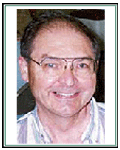 Ralph Heiden - Myrna (Drake) Bishopís husband, Jim,
(left) is a professor at Notre Dame so
we have been emailing things back and forth for a while now. It is
a local call so it doesnít cost anything. Ralph Heiden - Myrna (Drake) Bishopís husband, Jim,
(left) is a professor at Notre Dame so
we have been emailing things back and forth for a while now. It is
a local call so it doesnít cost anything.
(Note: This was in "ancient" times when internet connections
went through a modem and a telephone line. I had a second phone
line installed because while you were on the internet, you
couldn't get regular phone calls to your land line which is
another ancient technology.)
Helen (Henning) Heiden - Who is that now?
Ralph Heiden - That is Bertha (Heiden) Drakeís son-in-law. He is married to
Myrna.
Mary Lou (Heiden) Opfermann - Where is
Walter Bernsí daughter? Sheís a professor too.
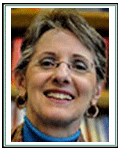 Ralph Heiden - Margie
(right) is a professor of linguistics at Purdue University.
She has her Ph.D. from the University of Illinois. Ralph Heiden - Margie
(right) is a professor of linguistics at Purdue University.
She has her Ph.D. from the University of Illinois.
Marie (Heiden) Tommelein - She got married recently didnít she?
Ralph Heiden - Yes. I think they are both professors at Purdue. There are also several medical doctors in the family now.
Lindaís daughter,
Erin, is a doctor. And so is
Connie Sedelbauer
and she is married to a doctor. She has a pretty responsible
position at the University of Michigan Hospital.
Dianne (Heiden) Houpt - Thatís where I work and I see her all the time there. Sheís
partly in our department now. She is so pretty.
Mary Lou (Heiden) Opfermann - Where is Lindaís daughter a physician at then?
Ralph Heiden - I think she is at the Indiana University Hospital in
Indianapolis.
Helen (Henning) Heiden - I think both of Lindaís daughters are moving back to
Michigan now. Linda mentioned that at the reunion.
Ralph Heiden - Itís also amazing to look at where all the kids have gone to
college. Some of
Carolís (Toburen) children went to Millersville
University in Pennsylvania.
Janiceís (Clark) went to Louisiana Tech
and Northeast Louisiana.
Dianne (Heiden) Houpt - Thatís interesting because before I came over here today, I
went back and looked through all that stuff to see where all my
nieces and nephews went to college.
William Frank Heiden - Millersburg. Isnít that were Mike (Toburen) was taking a
class and it turned out the guy teaching wasnít even a professor.
They arrested him and found out he did the same thing somewhere else
too.
Helen (Henning) Heiden - Mike said the kids knew more than he did!
Ralph Heiden - What do you two (William Carl and Marie) remember about going to
Bridge School?
Marie (Heiden) Tommelein - I had Kenneth Bordine the first year I went there and then
Harrison Dentel the rest of the way.
William Frank Heiden - We had fifty some kids all together in one room. He would
teach one grade at a time. But I really donít remember much about my
childhood.
Helen (Henning) Heiden - Seems funny he doesnít remember any of his childhood about
going to school and stuff.
Brick Tommelein - I agree with William, I just remember a few bits and pieces
here and there but not that much.
William Frank Heiden - I remember
Fritz Milhan hit me in the head with a ball
bat. We would play toss up and he swung and got me good. I didnít
have to go to school for about 3 months!
Ralph Heiden - I have a scar underneath my chin. The teacher used to ring a
bell at the end of recess and I was standing too close and she
popped me right under the chin.
William Frank Heiden - You should have sued them for that, Ha!
[Looking at a picture.]
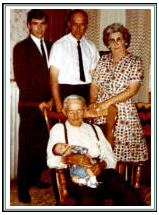 Ralph Heiden - That is the only five generation picture taken with Grandpa
Heiden. Ralph Heiden - That is the only five generation picture taken with Grandpa
Heiden.
Helen (Henning) Heiden - Who is that then?
Ralph Heiden - Thereís
Edna, Walter, Lauren, Grandpa and Laurenís first
son, Sean. Walter made me this nice print since he still had the
negative.
Marie (Heiden) Tommelein -
Denny
got us an old newspaper for 1945, the year we were
married. It was fun to look through but sometimes youíd look at a
price and say, ďGod, it couldnít have been that cheap back then!Ē
 I remember the first year after we were married, bread was still
rationed after the war. We had a neighbor who used to go and stand
in line to get a loaf of bread. She would take her 16 year old
daughter along with our ration stamp and get us a loaf too. I was at
home with the baby and couldnít go. I remember the first year after we were married, bread was still
rationed after the war. We had a neighbor who used to go and stand
in line to get a loaf of bread. She would take her 16 year old
daughter along with our ration stamp and get us a loaf too. I was at
home with the baby and couldnít go.
You had to wait in line at the Kroger store to get a loaf of bread.
Helen (Henning) Heiden - We only had one car in those days too so you couldnít just
go when you wanted to either.
Marie (Heiden) Tommelein - No. You were lucky if you had one car!
[Looking at a picture.]
Dianne (Heiden) Houpt - Isnít
Anitaís wedding dress just gorgeous?
William Frank Heiden - She worked for the Comstock family in Monroe. Then Howard
Comstock bought the Wakefield place next door. Carl and Anita lived
there for a while too.
Marie (Heiden) Tommelein -
Verdell was born there and
Velda was born here in País
house.
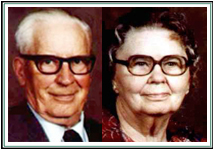 Helen (Henning) Heiden - Was your brother,
David, born here, Mary Lou? Helen (Henning) Heiden - Was your brother,
David, born here, Mary Lou?
Mary Lou (Heiden) Opfermann - He was born while my parents lived here but he was born
in the hospital.
Marie (Heiden) Tommelein - Roger
was born over to the store on the corner of
Ida-Maybee
and South Custer.
Mary Lou (Heiden) Opfermann - Remember when you used to stay with us sometimes when you
couldnít get home because the road was in bad shape?
Marie (Heiden) Tommelein - The night he was born, your dad went to get Mrs Spohr.

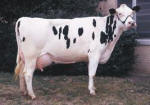 William Frank Heiden - There was another
small house down the road on the east
end of the
Wakefield farm and that is where Mary Lou was born. They
had that little house for the guy who worked the farm to live in. William Frank Heiden - There was another
small house down the road on the east
end of the
Wakefield farm and that is where Mary Lou was born. They
had that little house for the guy who worked the farm to live in.
Wakefield lived where Jesse Barnes lived and they didnít want to
work the farm. Old man Wakefield gave me a cow on the condition that
I would give them some of the milk. I used to take over a couple of
quarts a day to them.
When Wakefield died, he gave me a gold watch and he left
Art a horse
and buggy.
Marie (Heiden) Tommelein - That was a nice watch.
William Frank Heiden - Here it is. I still have it.
Brick Tommelein - Does it run, William?
William Frank Heiden - Yes we had the movement replaced. Itís got a porcelain
dial.
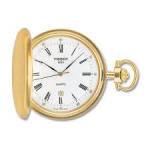 Helen (Henning) Heiden - We took it down to a jeweler to see how much it might be
worth in case somebody might break in and take it. They told us itís
not pure gold because it wears off over time. Helen (Henning) Heiden - We took it down to a jeweler to see how much it might be
worth in case somebody might break in and take it. They told us itís
not pure gold because it wears off over time.
William Frank Heiden - Iíve had it seventy years and I rarely carry it in my
pocket yet itís all worn off. Old Wakefield must have carried it for
a long time before he died.
Brick Tommelein - Some of those old railroad watches used to be worth
something.
Ralph Heiden - Why did Mr. Wakefield leave things to you boys?
William Frank Heiden - Well, we always waited on him and did things for him all
the time.
Brick Tommelein - Mil, was that when
Art started courting you when he had that
buggy?
Mildred (Roggerman) Heiden - No, he had an old Model T Ford by the time we starting
going out.
 Marie (Heiden) Tommelein - Remember we used to play tricks on old Wakefield? It was
after we got a telephone. When Ma and Pa would be gone, we would
watch to see when he was outside and then weíd call him up. As soon
as he got in the house, weíd hang up. Later he would tell Pa,
ďSomebody kept calling me all day today. By the time I got there,
theyíd hang up!Ē Marie (Heiden) Tommelein - Remember we used to play tricks on old Wakefield? It was
after we got a telephone. When Ma and Pa would be gone, we would
watch to see when he was outside and then weíd call him up. As soon
as he got in the house, weíd hang up. Later he would tell Pa,
ďSomebody kept calling me all day today. By the time I got there,
theyíd hang up!Ē
Ralph Heiden - I didnít think you guys did that kind of stuff.
Marie (Heiden) Tommelein - Oh, yes we did but Pa never knew it.
Mary Lou (Heiden) Opfermann - What kind of house was the one that I was born in? It has
been gone for a long time now.
William Frank Heiden - It was a nice enough house. I think it had one bedroom
upstairs. That was where Billy Miller and whatís her name lived.
Marie (Heiden) Tommelein - Helen MacDowell. He married that woman with a little girl
and we used to go to school together.
William Frank Heiden - We used to go sparrow hunting with him back when there was
a bounty on sparrows. He used to put the dead sparrows in his
pockets and heíd go to divide them up and weíd sneak into his other
pocket and take one out while he wasnít looking.
Marie (Heiden) Tommelein - I used to hold the flashlight for Art and
Heinie Heiden when
they would go after sparrows at night. They got 2 cents a piece and
I never got anything!
William Frank Heiden - I used to go into that house a lot of times. There was a
barn across the road on the south side. They had a corn crib and
chicken coop on the north side where the house was.
The red garage out in our drive came from that house when they tore
it down. The beams and things came from that old house.
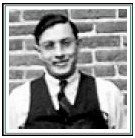 Ralph Heiden - Now, on this farm, Grandpa owned all the land on the north
side of the road to the river too? Did he sell off the parcels where
the other houses are now? Ralph Heiden - Now, on this farm, Grandpa owned all the land on the north
side of the road to the river too? Did he sell off the parcels where
the other houses are now?
William Frank Heiden - Leo was the first one to buy a three acre lot from Dixon
Road back to the river. His was the one right next to Jesse Barnesí
place. Then he sold three acres to Wally Grams. The last lot went to
Paul Goetz.
Ralph Heiden - I remember Jerry and Anabel from Toledo who had a small
place there where they came out on weekends.
William Frank Heiden - Those were the Feebacks. They bought the lot from Leo.
Mary Lou (Heiden) Opfermann - I think they sold the lot when they bought the house on
South Custer where Mother lives now.
Brick Tommelein - When
Leo bought it, were they going to live there? Wonder
why they never did.
Mary Lou (Heiden) Opfermann - They had intentions of building. I can remember them
looking at books and books of house plans but they never did build.
Probably because they had a chance to buy the home on South Custer.
William Frank Heiden - I think Pa sold all those lots for $1500 each.
Ralph Heiden - Someone thought that Grandpa delivered the mail at one time.
William Frank Heiden - I think they probably heard him talking about going down
to the corner when the road was muddy and getting the mail down
there and taking it to the people along the way.
[Looking at old family reunion pictures
from the 1920's]
Brick Tommelein - Mother
(Mary) Heiden was a tall woman. It didnít seem like it at
the time but when you look at her in these pictures, she seems quite
tall.
Mary Lou (Heiden) Opfermann - All the Rambows were big people.
Ralph Heiden - In this one old picture that guy with the hat and string tie
looks like he just got back from the wild west.
Helen (Henning) Heiden - He looks like Wyatt Earp!
Ralph Heiden - This was about 1921 or so, I think.
William Frank Heiden - Maybe that was old Bill Laas from Texas. He might look
like that.
Ralph Heiden - I asked people to write down a little remembrance of Grandpa
and Grandma and those have turned out to be really nice.
Brick Tommelein - Here, one of our kids says that Grandpa used to reward him
with a little sip of beer.
Marie (Heiden) Tommelein - Pa always knew all of his grandchildren by name. When you
think of it, that was amazing since he had so many of them.
William Frank Heiden - And itís not like today when your grandchildren are spread
all over and you donít get to see them very often. Back then, they
got to see them all the time.
Itís hard sometimes to keep track of them especially with the names
they come up with now. You donít see many Johns or Bills.
Marie (Heiden) Tommelein - Tell me about it!
Mildred (Roggerman) Heiden - My grandchildren go from A to Z.
Adam to
Zachary.
Helen (Henning) Heiden - Tom and Janiceís last grandchild is named
Peyton.
Marie (Heiden) Tommelein - Our neighborís have a little girl they named Montgomery
Alicia! That poor kid when she goes to school. She has a long life
ahead of her.
|

